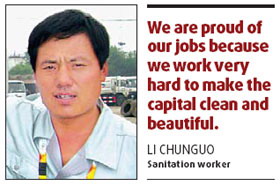In the late 1980s, Beijing's sanitation workers were described as "covered with dust on sunny days, covered with mud on rainy days."
For both sanitation workers and the city they serve, a lot has changed in terms of both collection and treatment of rubbish since those days. It is especially evident these days in the city as the 2008 Olympic Games continues to dazzle.

Workers clean up the artificial lake surrounding the Bird's Nest. [China Daily]
|
Thirty-nine-year-old Li Chunguo drives a truck to collect rubbish in Beijing's streets and alleys every day. And he is proud of his job.
A migrant worker from a village near Chengde in neighboring Hebei province, he came to Beijing 19 years ago take a job shunned by most local residents. He works for the Beijing Environment Sanitation Engineering Company, the largest State-owned sanitation enterprise serving Beijing.
"The working conditions at that time (in the late '80s) were rather harsh", he recalled. "We often worked from before dawn until after dark."

Sanitation workers had to manually shovel the rubbish into the trucks. "In summer the rubbish smelled terrible and in winter it was often bitterly cold," Li said.
Today, modern equipment has made the job much easier. "We now drive modern waste collection vehicles from Mercedes-Benz or Hyundai, with air-conditioners and music," Li said.
Sanitation workers have a different attitude now about their jobs. "When I first came here, many workers saw their jobs as a means to come to Beijing to make a living when they had no other choice," he said. "No Beijing residents wanted to do the job."
Now some 20 or 30 percent of the workers are natives of Beijing and a junior high school education is a must.
Sanitation workers are usually good employees because they are willing and able to endure hardships.
"Our workers receive a lot of training and are very competitive in the job market," he said.
After working as sanitation workers for a few years, they usually stand a good chance of finding better jobs elsewhere. But Li himself has remained a sanitation worker for the past 19 years because, he says, he is "emotionally attached" to his job.
"We are proud of our jobs because we work very hard to make the capital clean and beautiful," he explained.
Now, he said, he feels "so happy and honored" to work for the Olympic Games.